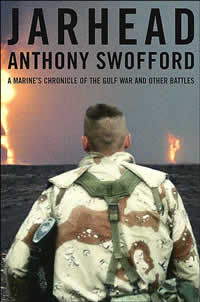Book Notes
 Anthony Swofford, Jarhead; A
Marine’s Chronicle
of the Gulf War and Other Battles (New York: Scribner, 2003)
Anthony Swofford, Jarhead; A
Marine’s Chronicle
of the Gulf War and Other Battles (New York: Scribner, 2003)
One of the tattered keepsakes in my wallet is my Selective Service System Status Card, SSS Form 7, December 1972—better known as a draft card. I was number 31-93-55-1288. But since the Vietnam war was winding down, thank God I never experienced war.
For those of us who have never experienced battle firsthand, it is all too easy to glorify and sanitize what war is really like. Swofford, a Marine sniper who served for seven months in the Gulf war, disabuses us of these tragically naïve and romantic notions of war, cloaked as they often are in the garb of patriotism.
What is war really like? For Swofford it meant sadistic drill instructors, broken equipment, binge drinking for days, whores, no hot food or showers for weeks at a time, sand in every crevice of your body, maggots infesting the bodies of dead Iraqis, craziness that drives a soldier to attempt suicide, the palpable lust to kill, soiling your pants in the heat of combat due to primal fear, and the anger knowing that “a soldier always fights for a sorry cause” (p. 134).
Even the best media treatments give us tightly scripted versions of war. There is a sense, for example, in which we should not be surprised at the photos of Americans torturing Iraqi prisoners. Our soldiers are not Girl Scouts; they are trained killers and torture is only one of the tools of their trade. Swofford writes that he is an atheist. Based upon his war experience he insists that there is a deep “incompatibility between religion and the military…(for) the mission of the military is…to extinguish the lives and livelihood of other humans. What do you think all those bombs are for?” (p. 172). For an unvarnished, firsthand account of what war is really like, read Swofford, along with the fine volume by Chris Hedges, War is a Force That Gives Us Meaning (2003).


